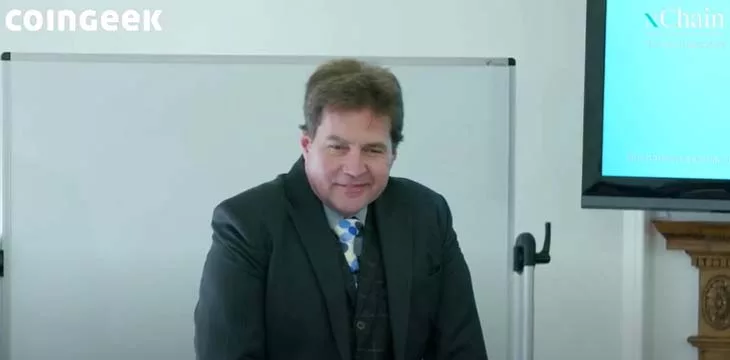|
Getting your Trinity Audio player ready...
|
Despite what he’s said about exchanges in the past, Dr. Craig Wright does like the technology. But it should be used for businesses trading real assets of real value to the economy, not empty price speculation. This third session of the fifth Bitcoin Masterclasses series examines why NFTs and “atomic swaps” are necessary and the best ways to implement them legally.
“This is what NFTs should be used for—buying, selling, etcetera … if we’re doing this correctly, we should be able to buy, swap all kinds of things,” Dr. Wright remarks.
What we’re effectively doing here is: Party A proving what they actually have; what the goods and services are and tracing them; and bartering one (tokenized) good for another while knowing its full history. We’re swapping inventory, and yes, even competitors will do this sometimes if it’s mutually beneficial.
The example of perishable goods springs to mind again, but other goods/services with values may change with time and circumstances, such as concert tickets and travel-related items. Luxury brands and electronics are interested in reducing the number of counterfeit goods on the market. For all these items, it’s handy to know their full history.
Brainstorming ideas for NFTs and atomic swaps in various industries
This session features a short breakout session where the audience brainstorms ideas for real-world NFT use cases and secondary exchange markets (e.g., commodity futures) that may spring from them—as well as how these might be implemented.
The first suggestion is for an entertainment “OG superfan token,” which is not a new idea but an item for which there’s a clear demand. Recording artists have shown there’s value in selling limited/special editions, mass releases with low serial numbers, and special access at concerts (eg: meeting the performers).
Other suggestions include tokenized supply chains for wineries and small-scale agriculture, profit-sharing, authorized resale marketplaces for sports and other events, returns processes, customized fashion items with royalties for the designer, car rentals, and possibly even a trading market for invoices and crowdfunding activities for projects.
Dr. Wright urges participants to consider other things like upper limits on a market’s size and potential amounts that can be raised, legal/tax/accounting issues (are you selling a security or commodity?), and whether something is considered a “pre-sale.”
“Practically everything where you don’t have direct cash payments is a security of some sort. That’s where people go wrong. Whether it’s a security under regulations is another question,” he says.
Brainstorm suggestions may reflect the demographics of those working in the blockchain industry, so there’s often a skew towards high-end/niche entertainment and lifestyle goods. However, it’s important to remember that much of the economy consists of more mundane supply chains like supermarkets and machine parts, and these sectors may contain more untapped value. Studying how these industries operate is beneficial.
Regardless of the industry, atomic swaps can work for anyone doing peer-to-peer exchanges, and this direct form of commerce reduces costs and increases efficiency. They also enable more participation from independent parties along the chain—all earning their correct percentage of a final sale—rather than everything being controlled by large conglomerates. Smart contracts allow these percentages to be negotiated, adjusted, and paid automatically, no matter how small.
“Visa and Mastercard make more money from Walmart sales than Walmart does,” Dr. Wright notes.
The Bitcoin Masterclasses series is aimed at developers, and sessions often contain a lot of technical detail. However, most are also beneficial to entrepreneurs with little or no technical knowledge, looking to expand their imagination on what’s possible. As always, we recommend anyone interested in the blockchain world to watch these sessions and hopefully find the next big (and profitable) idea.
Watch The Bitcoin Masterclass #4: nLocktime and Delayed Transaction

 02-19-2026
02-19-2026 




